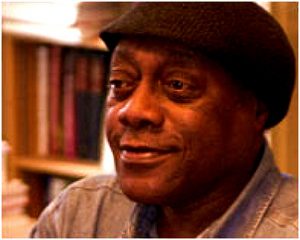
James Alan McPherson was an American essayist and short-story writer. He was the first African-American writer to win the Pulitzer Prize for Fiction, and was included among the first group of artists who received a MacArthur Fellowship. At the time of his death, McPherson was a professor emeritus of fiction at the Iowa Writers' Workshop.
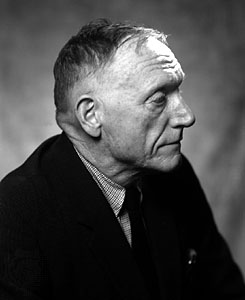
Robert Penn Warren was an American poet, novelist, and literary critic and was one of the founders of New Criticism. He was also a charter member of the Fellowship of Southern Writers. He founded the literary journal The Southern Review with Cleanth Brooks in 1935. He received the 1947 Pulitzer Prize for the Novel for All the King's Men (1946) and the Pulitzer Prize for Poetry in 1958 and 1979. He is the only person to have won Pulitzer Prizes for both fiction and poetry.
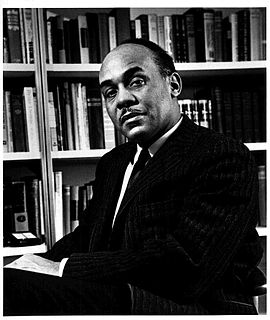
Ralph Waldo Ellison was an African-American novelist, literary critic, and scholar best known for his novel Invisible Man, which won the National Book Award in 1953. He also wrote Shadow and Act (1964), a collection of political, social and critical essays, and Going to the Territory (1986). For The New York Times, the best of these essays in addition to the novel put him "among the gods of America's literary Parnassus." A posthumous novel, Juneteenth, was published after being assembled from voluminous notes he left upon his death.
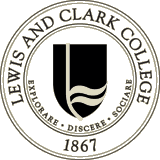
Lewis & Clark College is a private liberal arts college in Portland, Oregon. Originally chartered in 1867 as the Albany Collegiate Institute in Albany, Oregon, the college was relocated to Portland in 1938 and in 1942 adopted the name Lewis & Clark College after the Lewis and Clark Expedition. Contemporarily, it has an undergraduate College of Arts and Sciences, a School of Law, and a Graduate School of Education and Counseling.

Invisible Man is a novel by Ralph Ellison, published by Random House in 1952. It addresses many of the social and intellectual issues faced by African Americans in the early twentieth century, including black nationalism, the relationship between black identity and Marxism, and the reformist racial policies of Booker T. Washington, as well as issues of individuality and personal identity.

Charles Richard Johnson is a scholar and the author of novels, short stories, screen-and-teleplays, and essays, most often with a philosophical orientation. Johnson has directly addressed the issues of black life in America in novels such as Dreamer and Middle Passage. Johnson was born in 1948 in Evanston, Illinois, and spent most of his career at the University of Washington in Seattle.
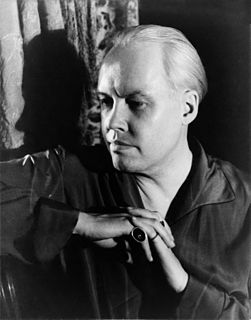
Carl Van Vechten was an American writer and artistic photographer who was a patron of the Harlem Renaissance and the literary executor of Gertrude Stein. He gained fame as a writer, and notoriety as well, for his 1926 novel Nigger Heaven. In his later years, he took up photography and took many portraits of notable people. Although he was married to women for most of his adult life, Van Vechten engaged in numerous homosexual affairs over his lifetime.
Albert L. Murray was an American literary and music critic, novelist, essayist, and biographer. His books include The Omni-Americans, South to a Very Old Place, and Stomping the Blues.
Richard Warrington Baldwin Lewis was an American literary scholar and critic. He gained a wider reputation when he won a 1976 Pulitzer Prize for Biography or Autobiography, the first National Book Critics Circle Award for nonfiction, and a Bancroft Prize for his biography of Edith Wharton. The New York Times called the book "a beautifully wrought, rounded portrait of the whole woman, including the part of her that remained in shade during her life" and said that the "expansive, elegant biography ... can stand as literature, if nothing else."

Juneteenth is Ralph Ellison's second novel, published posthumously in 1999 as a 368-page condensation of over 2,000 pages written by him over a period of 40 years. It was originally written without any real organization, and Ellison's longtime friend, biographer and critic John F. Callahan, put the novel together, editing it in the way he thought Ellison would want it to be written.
Arnold Rampersad is a biographer, literary critic, and academic, who was born in Trinidad and Tobago and moved to the US in 1965. The first volume (1986) of his Life of Langston Hughes was a finalist for the Pulitzer Prize and his Ralph Ellison: A Biography was a finalist for the 2007 National Book Award.
Francis Steegmuller was an American biographer, translator and fiction writer, who was known chiefly as a Flaubert scholar.

Leon Richard Forrest was an African-American novelist. His novels concerned mythology, history, and Chicago.

Three Days Before the Shooting... is the title of the edited manuscript of Ralph Ellison's never-finished second novel. It was co-edited by John F. Callahan, the executor of Ellison's literary estate, and Adam Bradley, a professor of English at the University of Colorado at Boulder. The book was published on January 26, 2010, by Modern Library. An excerpt of Ralph Ellison's unfinished manuscripts was previously published as Juneteenth (1999).
Darryl Pinckney is an American novelist, playwright, and essayist.

James Kendall Hosmer was an American (Union) soldier during the American Civil War, a pastor, library director, historian, author and a professor of history and literature. Members of the Hosmer family fought in the French and Indian War, American Revolution and the Civil War. As a pastor of the First Church in Deerfield, Massachusetts he left the ministry, feeling duty bound to join the U.S. Army to serve in the Civil War, insisting to serve at the front, where he participated in several major campaigns. As an author and historian he later wrote and published several works about and involving the Civil War and how he viewed the cause of both the North and South. He also authored a number of other works relating to early American history, along with several novels and a fair number of poems. Hosmer also reviewed and published accounts about the Lewis and Clark expedition at a time when full accounts of the expedition were very few in number and out of print. During his career he corresponded with many prominent writers and historians involving his works. In his latter life he held several prominent positions in various literary associations, including his position as president of the American Library Association.
Erasure is a 2001 novel by Percival Everett and originally published by UPNE. The novel reacts against the dominant strains of discussion surrounding the publication and criticism of African American literature.
Adam Bradley is an American literary critic, professor, and a writer on popular culture. He is the author or editor of six books. Bradley has written extensively on song lyrics as well as on the literature and legacy of the American novelist Ralph Ellison. His commentary has appeared in The New York Times, The Wall Street Journal, The Washington Post and in numerous other publications. He is a professor of English at the University of Colorado, Boulder where he directs the Laboratory for Race & Popular Culture.
Robert A. Hill is a Jamaican historian and academic who moved to the United States in the 1970s. He is Professor Emeritus of History and Research Professor at the University of California, Los Angeles (UCLA), and Visiting Fellow at The Sir Arthur Lewis Institute of Social and Economic Studies (SALISES), University of the West Indies at Mona, Jamaica. A leading scholar on Marcus Garvey, Hill has lectured and written widely on the Garvey movement, and has been editor-in-chief of The Marcus Garvey and Universal Negro Improvement Association Papers for more than 30 years. Reviewing the first volume in 1984, Eric Foner wrote: "'The Marcus Garvey and Universal Negro Improvement Association Papers' will take its place among the most important records of the Afro-American experience."
Patrice Rankine is a Professor of Classics at the University of Richmond. He is a leading scholar in the area of classical reception.










